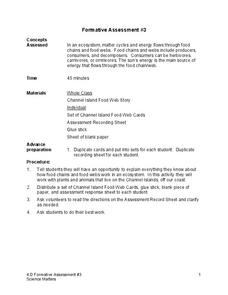Scholastic
Study Jams! The Nitrogen Cycle
Expose your class to the steps of the nitrogen cycle with this short clip. Colorful computer imagery and animation explain how nitrogen travels from the atmosphere as a gas into plants and soil, where bacteria convert it into nitrates....
Curated OER
Mealworms
Crawl into the world of the darkling beetle with this scientific investigation. Watch as the insects move through the larval, pupal, and adult stages of life, recording observations along the way. Discuss the necessities of life as young...
Biology Junction
Nonvascular and Simple Vascular Plants: Mosses to Ferns
Sometimes conservationists use specific plants to prevent erosion or fight invasive species. A 50-slide presentation covers both nonvascular and vascular plants. It discusses the plants, their stages and life cycles, reproduction, uses,...
Teach Engineering
Photosynthesis—Life's Primary Energy Source
Wouldn't it be great if you could produce your own food? Scholars learn about the processes of photosynthesis and cellular respiration in plants. They consider how to use photosynthesis as a model of an efficient system and how to apply...
Core Knowledge Foundation
A Time for All Seasons - Fall
The weather is cooling down and the leaves are starting to change color; fall is right around the corner. Celebrate this special time of year with this earth and life science lesson series that teaches children about the...
Core Knowledge Foundation
A Time for All Seasons - Summer
The sun is shining and the birds are singing, what better time to teach young learners about the fun season of summer. In this week-long science series, children learn how the rotation and orbit of the earth influence...
Core Knowledge Foundation
A Time for All Seasons - Winter
As the days get shorter and a chill enters the air, it's time to start teaching your little ones about the wondrous winter season. Through a series of teacher demonstrations, whole-class read alouds and discussions, and hands-on...
University of Southern California
Mastering Microbes
Small but mighty! Learners explore the role of microbes in a healthy ecosystem. An engaging lesson asks pupils to design an aquaponics system that demonstrates that healthy microbes are necessary to maintain the ecosystem.
Virginia Department of Education
Weather Patterns and Seasonal Changes
Get your class outside to observe their surroundings with a lesson highlighting weather patterns and seasonal changes. First, learners take a weather walk to survey how the weather affects animals, people, plants, and trees during...
Chicago Botanic Garden
Seasons of a Plant
The third in a series of six lessons is an engaging three-part activity defines that discusses phenology, focusing on the cyclic seasons of plants. Pupils then observe phenology outside before determining how climate change can...
California State Parks
Energy Flow Through an Ecosystem
One of the key concepts in life science and biology is the cycling of energy throughout an ecosystem. Learners can take notes on the topic using the vocabulary included within the presentation. From producers making their own food...
Science Matters
Lotusland
It's time for a field trip! Scholars take their new-found knowledge of adaptations and seed dispersal on a field trip to a local botanical garden. They gain an up-close look at how ecological interdependence works in a distinct...
Agriculture in the Classroom
A Rafter of Turkeys
How did that turkey get from the early Aztec culture to your table? Learn about the history of wild and domesticated turkeys in North America, as well as their inclusion in Thanksgiving traditions, with a two-part agricultural science...
American Museum of Natural History
What's the Big Deal About Water?
It may seem simple, but water is one of the most unique substances on Earth. An interactive online lesson describes its properties and importance in so many different situations. Learners interact with the lesson to learn the role water...
Wilderness Classroom
Pollution
Educate scholars on pollution—air, water, and land—with a series of lessons that begin with a thorough explanation of each type. Learners then take part in three activities to reinforce the importance of reducing pollution. They...
Science Matters
Formative Assessment #3
Thirteen short-answer questions follow a brief food web activity in a formative assessment designed to test knowledge of ecosystems and the energy that flows through them.















